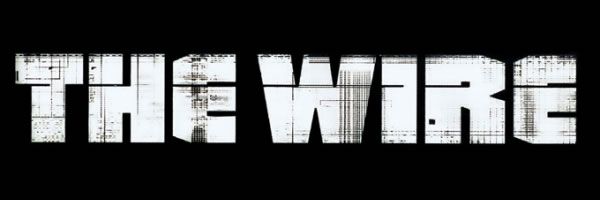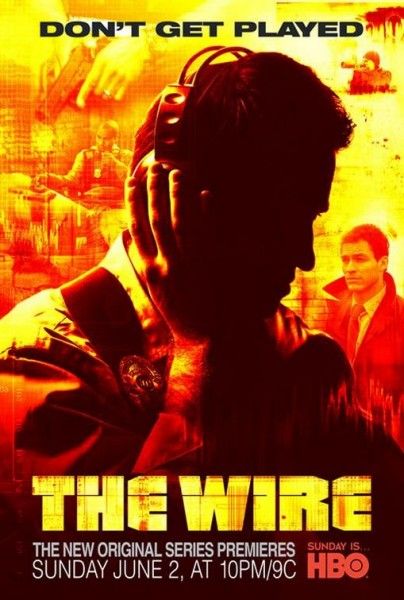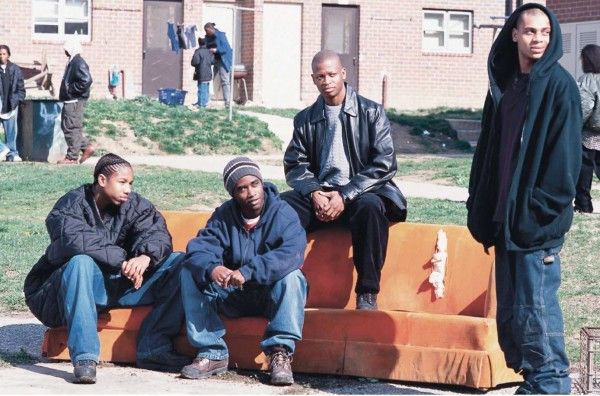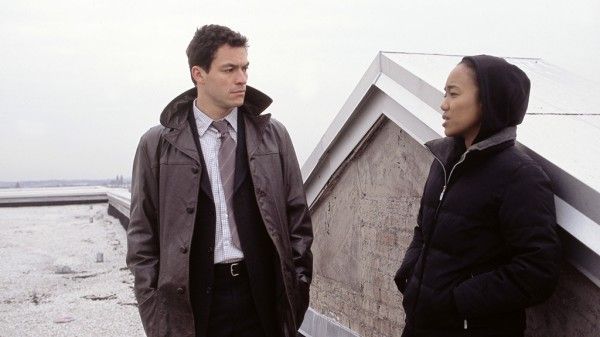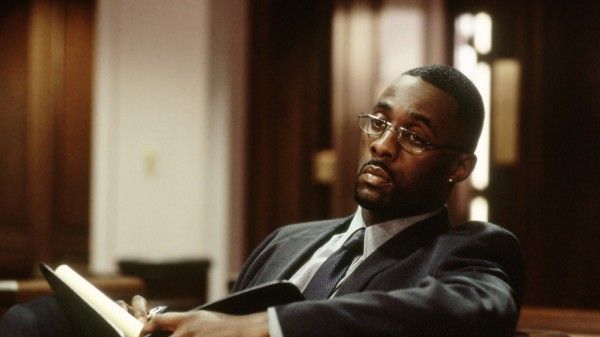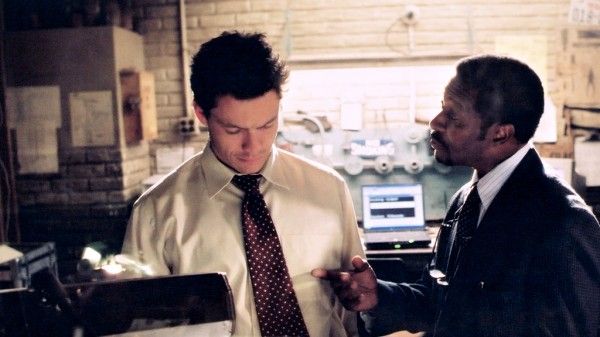Up until the past 15 years or so, television series were firmly episodic. Serialized TV (outside of mini-series) risked alienating viewers since it stopped anyone from coming in mid-season. However, with the rise of DVDs, OnDemand, and digital downloads, serialized TV series have become firmly established. Some shows still retain an episodic nature, but some series—particularly dramas—have been built around telling one long story over the course of an entire season. Our new feature, Seasoned, will review a TV series by season rather than by episode.
And we couldn't think of a better kick-off to this feature than HBO's The Wire. Hit the jump for my review of the groundbreaking drama's first season.
Before I begin my review of The Wire, I would like to establish two important points regarding my viewing experience. First, I previously saw the first three seasons of the series, but it was several years ago, and I can only remember the broadest aspects of the plot. For a show where the devil is in the details, my review will basically be a first viewing. This leads to my second point: I am purposely avoiding outside commentary on Season One because it may reveal plot points about the other seasons, and I would like my viewing to be as fresh as possible.
[Warning: Spoilers Ahead]
In June 2002, HBO began airing The Wire, a police drama unlike any that had come before. Created by former Baltimore police reporter David Simon and former homicide detective Ed Burns, the show blasted apart every cliché and comfort of the standard police procedural. Simon had already begun picking apart the genre with his series Homicide: Life on the Street, but The Wire went far beyond the perspective of cops.
Set in Baltimore (a city where Simon had the greatest familiarity) and with the blessing of the city's mayor, the show took an unflinching look at the intersection of police investigations, criminal organizations, social issues, and the politics in between. The show rarely, if ever, took a hard stance on characters simply being "good" or "evil", although some were portrayed as more admirable than others. It's a series based around compromise, and exploring the morality and necessity behind those compromises. Furthermore, The Wire tends to function more as social observation rather than social commentary. Simon and Burns refuse to provide answers or solutions because the story proves there's no quick fix when it comes to a complex web of conflicts, and, more importantly, to human nature.
The self-destructive nature of Homicide Detective Jimmy McNulty (Dominic West) begins our journey into the complicated world of Baltimore's cops and criminals. Westside drug kingpin Avon Barksdale (Wood Harris) has left a string of bodies as collateral damage in his criminal operation. After McNulty watches Avon's nephew D'Angelo (Larry Gilliard) escape conviction due to witness intimidation, he brings his grievances to Judge Phelan (Peter Gerety), and says that the murders will continue until Avon is brought to justice. Phelan uses his political might to push the Deputy Commissioner Ervin Burrell (Frankie Faison) to create a detail to investigate Barksdale. Burrell tells the detail's leader, Lieutenant Cedric Daniels (Lance Reddick), to keep the investigation brief and contained, but McNulty's constant needling and the mounting evidence against Barksdale expands the scope of the case.
Most police dramas would focus simply on the work of the detail, and would barely acknowledge the criminal organization or the political factors guiding and obstructing the investigation. In The Wire, these elements are not only acknowledged, but deemed essential. Much like the cops, the criminals have a clear organizational structure but it's far more streamlined and functional than what the police (or "po-leece" in the dialect of both the cops and criminals) have. Avon is the top dog, Stringer Bell (Idris Elba) is his smart and steady second-in-command, and then there are lieutenants who function both as muscle and overseers of various parts of the drug-dealing locations. DeAngelo is demoted from the Towers to "The Pit", which makes less money and forces DeAngelo to function as both a boss and a mentor to the teenage dealers Poot Carr (Tray Chaney),Bodie Broadus (J.D. Williams), and Wallace (Michael B. Jordan). Of course, violence is also a strong factor in keeping the ranks in line. As Detective Thomas "Herc" Hauk (Domenick Lombardozzi) points out to his partner Ellis Carver (Seth Gilliam), the cops will never "win" because the criminals' system of promotion and punishment is far more powerful than what the Baltimore Police Department can dish out.
The Wire is a deeply complicated show and I could spend pages going through every plot development and character motive. But this isn't meant to be a recap. This is an outline of the organizations in play: The Law, The Politics, and The Criminals. Although the show's title is a literally a reference to the wiretapping the detail used to build their case against Barksdale, it's figuratively about the wires that interconnect and crossover the various aspects of the show. For example, the detail works with Omar Little (Michael K. Williams) in order to bring down Barksdale even though Omar is a criminal who participates not under pressure or threats, but because he wants revenge against Barksdale for the brutal retaliatory murder of Omar's partner and boyfriend. The detail also works with Bubbles (Andre Royo), a drug addict who volunteers as a criminal informant in order to punish Barksdale's crew for stomping on his friend.
In a standard police procedural, there's no cooperation. There's only intimidation. The cops hang a charge over a criminal's head and the criminal either agrees to inform or they go to jail. In order to keep the plot moving forward, the criminal usually agrees to work with the cops. That kind of intimidation exists on The Wire, but it's used not only as a means of coercion, but also a means of unsanctioned punishment giving way to straight-up police brutality. When Detective Greggs (Sonja Sohn), a smart and honorable investigator on the detail, tries to get a hitter Barksdale's crew to cop to a murder and flip on his boss, the perp only throws hateful epithets her way. This behavior is greeted a severe beat-down by Greggs and two more cops inside the interrogation room. He deserves it, but we'd like to think cops are above such brutality. And in a normal cop show, such brutality would become the defining issue of an episode, and the cop would be punished. In The Wire, it's fairly commonplace, and so are other short-cuts. There are no straight-arrow po-lice on the show, and if there were, they'd be totally ineffective.
So are Greggs and her cohorts corrupt? Are they unfit for duty? Shouldn't they be above such behavior? The Wire doesn't quibble with these issues as plot points because the show isn't about moralizing. The show lives and breathes in the grey area, and it leaves the moral judgments to the viewer. That's not to say that a character's morality doesn’t affect their circumstances. If placed in a dramatic range, The Wire would absolutely be a tragedy. Some of the characters are doomed by their own personalities and moral code. McNulty's anti-authority streak, short temper, and self-righteousness mean he'll always hurt himself, and his resultant self-loathing will push away those around him. D'Angelo and Wallace show empathy in a game that has no patience for it, and both suffer and, in the case of Wallace, die as a result.
Although empathy and righteousness are flaws in the world of The Wire, there are also traits that will push you ahead. For Simon and Burns, the most valuable aspects a person can have are intelligence and cunning, and the characters with these qualities are fan favorites. Detective Lester Freamon (Clarke Peters) is a quiet powerhouse who spends time making dollhouse furniture and being the smartest guy on the detail. On the criminal side, you have Stringer Bell, a man of steady demeanor and patience, and you have Omar, an outsider who is able to outsmart a deadly operation like Barksdale's. And to be a king in this world, to be Avon Barksdale or Baltimore politicians, you just have to mix in ruthlessness and selfishness.
All of these aspects make The Wire a thoughtful, brainy experience that would be rewarding, but not necessarily entertaining. To draw the viewer into the rich themes, Simon and Burns walk a fine line between dramatic flourishes and deglamorizing their world. For the show's creators, the "action" scenes are the least interesting part of the mix. The raids always lack tension, and one of the season's biggest "action" moments—Greggs getting shot—happens off camera. The tension comes from the detail trying to find Greggs' vehicle. Getting the killer of Avon's ex-girlfriend isn't triumphant. What's triumphant is the scene where McNulty and his partner Bunk Moreland (Wendell Pierce) reconstruct the crime scene using only the word "Fuck." One of the season's most exciting scenes is when Freamon tells detail members Leander Sydnor (Corey Parker Robinson) and Roland "Prez" Pryzbylewski (Jim True-Frost) how to pull charter records. In The Wire, the drama is always from the chase, never from the capture. The first even sets up the specter of what could be cops' greatest chase and greatest futility: "Following the money," which would clearly lead to the dirty-as-hell State Senator R. Clayton "Clay" Davis (Isiah Whitlock Jr.).
However, this emphasis on chase-over-capture inevitably leads to an anti-climax, which serves the themes, but not the drama. It's a result of always putting realism first, and the reality of Baltimore as viewed through the lens of The Wire is futility. Avon's business goes on without him. The higher-ups in the Baltimore Police Department keep their standing. The detail ends, the team we've grown to love is broken up, McNulty is kicked out of homicide, Daniels loses his shot at being a major because he put the case ahead of his career, and Greggs is stuck recovering in a hospital. But Freamon gets pulled out of boring Pawn Shop division and reassigned to homicide, and the last shot of the season is a smiling Omar, sticking-up a drug dealer in the Bronx, and saying "It's all in the game."
At the end of the first season of The Wire, the show manages to turn expectations on their head, and then laughs off the simple label of "police procedural." The Wire has been called literature in television form, and it's not an unfair description. Season One of The Wire brings us characters, backstories, dynamics, organizations, and a rich setting—all of the elements that make up a strong drama. It's also a show that can't be "skimmed" and even has long monologues. From the get-go, Simon and Burns proved they had made a show unlike any other, and I can't wait to see what Season Two has to offer.

